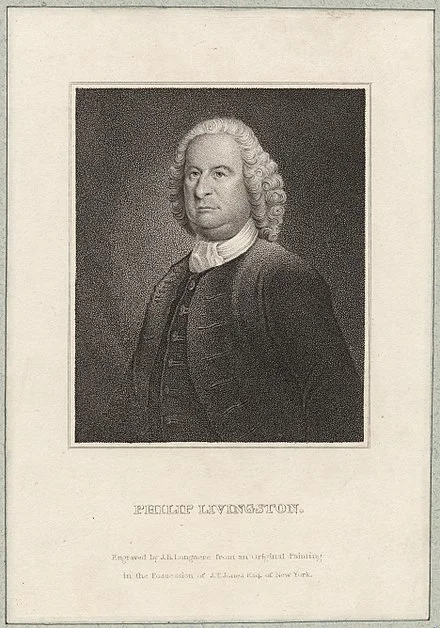Isaac Low Organizes The Committee Of Fifty-One
Isaac Low was an early leader of New York’s Revolutionary Government.
Low, however, turned Loyalist after the Declaration of Independence.
This brings up a question I’ve asked several times: if a person was singularly important to the beginnings of the American Revolution but then became a Loyalist, are they still a Founding Father?
Read this article and let me know what you think in the comments. Check back with us tomorrow when we will discuss Low’s brother Nicholas who remained a Patriot.
The Port Act and New York
In the Spring of 1774, Parliament issued the Boston Port Act. This legislation closed the Port of Boston to trade as a punishment for the Boston Tea Party.
The Port Act spread fear throughout the colonies.
New York City, another important trading port, was particularly frazzled. The merchants and seamen of that city decided to hold a discussion regarding the best method of protecting their freedoms.
A meeting was called together at Fraunces Tavern. The Chairman elected to run this meeting was Isaac Low.
Issac Low and the Committee of Fifty-One
Isaac Low was a wealthy New Yorker who owned several businesses, including a merchant house and various real estate properties. He had already served for a time as Chairman of the colony’s Committee of Correspondence and was known to be outspoken regarding Britain’s new taxation policies.
The day after this meeting, a notice was published calling for a public forum to select a group of representatives to act on behalf of the colony in halting British oppression. Two days later, a vote was taken and within a week these delegates came together for the first time.
This meeting became known as the Committee of Fifty-One and they again selected Isaac Low as their Chairman.
First Continental Congress
Low oversaw the Committee as it responded affirmatively to a letter from Boston requesting a Continental Congress. Isaac was then chosen as one of the representatives from New York.
This event became known as the First Continental Congress.
Low was a signatory of the Continental Association. The Continental Association is often considered the first Founding Document of the United States.
The result of the First Continental Congress was a boycott on British produced goods. Isaac supported this decision.
De Facto Governor
Upon returning from Philadelphia, the delegates learned that the New York General Assembly (still the official British government of the colony) decided not to support the recommendations of the First Continental Congress. The Committee of Fifty-One reconvened (now as the Committee of Sixty).
Isaac Low led this Committee through restyling itself as the New York Provincial Congress. With this move, the Committee had in actuality become the government of the colony.
Isaac Low, as head of the Congress in it’s opening days, was for a brief time essentially governor of New York. Although this lasted just a few weeks, Low oversaw the recruiting of the State’s first revolutionary soldiers as well as the first fortifications of the city.
Hesitation
When news of the Battle of Lexington and Concord arrived, the rebels decided to replace the moderate Low with a more radical Chairman. Afterwards, Isaac continued to participate in the Provincial Congress but slowly faded into the background.
Low, like most of the participants in these protests, wanted to make changes only to Parliament. They all still considered themselves loyal to the King and hoped to put a quick end to hostilities.
A year later, when the Declaration of Independence was signed, many of the early leaders were uncomfortable with the decision.
Isaac was one of these men.
Loyalist
In August of 1776, Low decided things had gone too far. His judgment led him to side with the Loyalists.
He left New York City but was quickly held up by rebels in New Jersey. Due to his important role in bringing his hometown toward the Patriot Cause, George Washington ordered Isaac be released.
Low returned to New York the following month, after the city was occupied by the British. He remained there for the duration of the war, but left as a refugee when the city was evacuated.
Isaac Low never returned home.
Assessment
Low is an extremely interesting character to review when discussing the American Revolution because he was so important in the early days of revolt. Without him, New York may have organized tremendously slower.
Low’s decision to go Loyalist speaks to just how controversial the Declaration of Independence actually was. Its publication was just a year and a half after the First Continental Congress and barely a year from when hostilities broke out in Massachusetts.
It wasn’t just the idea of leaving Great Britain that made people nervous. The bigger question was: were the colonies ready to run themselves as States on an international stage? While that question has now been answered, it was no certain thing back in the 1770’s.
So what do you think, should Isaac Low be considered a Founding Father?
Before you decide, try reading these articles about Joseph Galloway and Benjamin Church who’s status as Founder is in question.
If you’d like to learn more about Loyalists in New York, I’d recommend picking up a copy of ‘Loyalists in New York’ through our affiliate link below.






